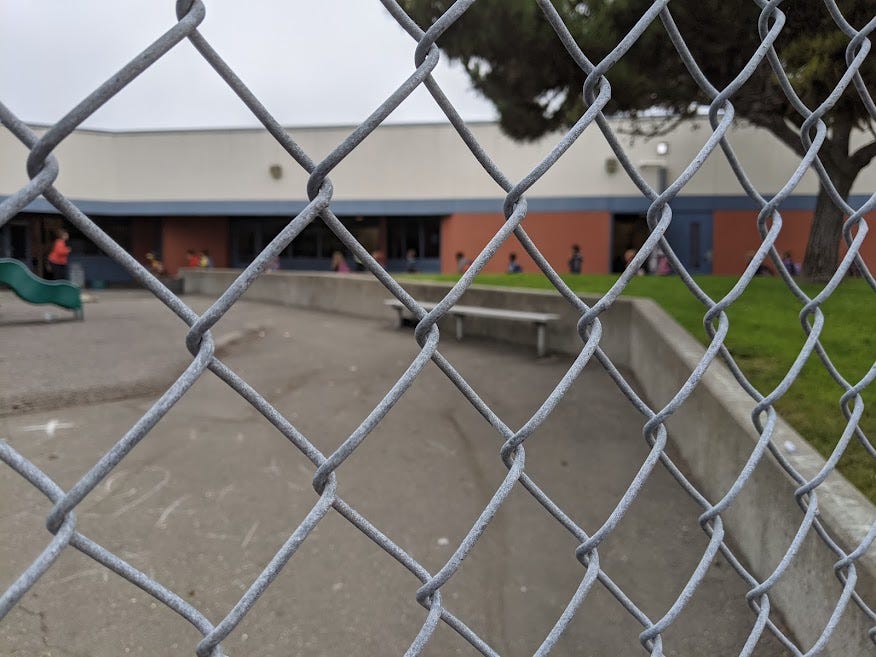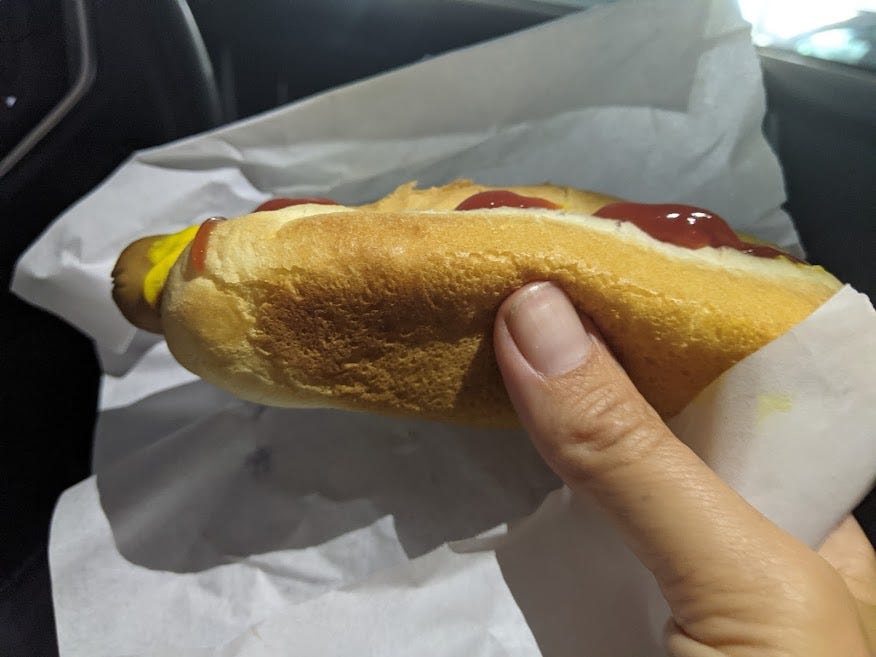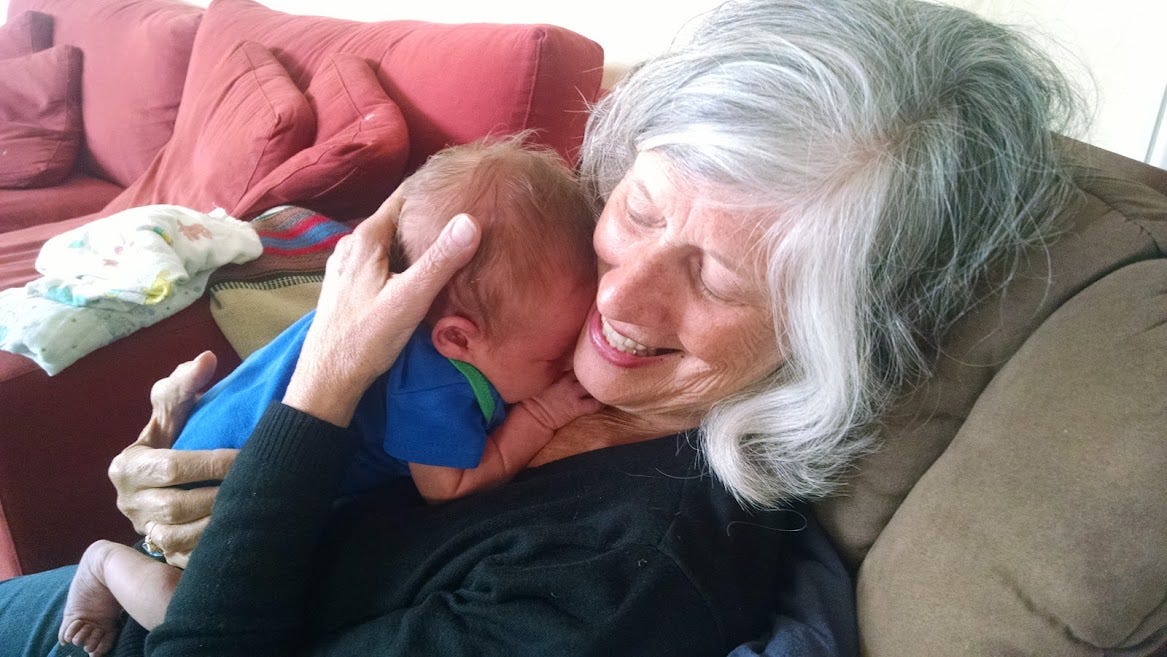Why Does It Hurt So Bad???
And other songs written by Babyface that express my feelings about my son starting Kindergarten
Friends! I had the great pleasure of publishing a piece in The Romper earlier this week about Emily Oster and the optimization of parenting. Check it out here!
Also, we have a lot of new readers this week. Welcome! Now, everyone say your name and an animal that starts with that same letter…
Though in many parts of the country it is still legally summer, Monday was the first day of school here in Oakland, and, thus, my son’s first day of Kindergarten. Drop-off was a scene—dozens of excited, nervous, parents and children in masks, a sea of anxious, searching eyes. Tiny people with backpacks twice their size. Kids holding it together until they reached the gate, where parents had to peel off, due to covid protocols, at which point their knees buckled and they started to shake and the principal, using her principal spidey senses, would materialize out of nowhere and guide them by hand into the gaping mouth of the blacktop.
My Kindergarten teacher, Mrs. Lund, meant the world to me. She was incredibly kind and loved children. She had big 80’s bangs and a fabulous Boston accent (she was the first of many teachers to pronounce my name “Sare-er”) and she smelled better than any woman I had ever known. Her classroom was enormous—it had a lofted walkway all around the walls and a million toys and books and lots of light. My mother said that on the first day of school she hung around in the classroom for a while, like many other mothers, and I ran off and got into this thing and that and occasionally scampered back to show her something I was pumped about, but mostly didn’t seem to need her. She transitioned to outside the school, where she remembers that she just kind of milled about with some other mothers, until the children were let out a few hours later.
I often found myself in the position of being Mrs. Lund’s helper, and, other than the time I proclaimed at lunch one day that I loved chocolate pudding, and Steve Lessaint said “Then why don’t you marry it?!” it was a blissful year. When I moved on from Mrs. Lund’s class, I came back to be her teacher’s aide—at lunch, when I was too overwhelmed by social dynamics and the daunting physical demands of jump rope to go to recess, or when I finished my work early, which was most of the time. I did this all the way through eighth grade, sometimes multiple times a day—reading to the children (at times wearing my Kermit the Frog costume), sorting mixed-up puzzle pieces, learning from Mrs. Lund, a master of her craft.
I have often wondered what my life would have been like if my parents had sent me to a school that was more academically rigorous than the public school in my neighborhood—would I know more about history, would I have a more successful career, would I be more accustomed to pursuing tasks that I find challenging. It’s impossible to know. But I do know that without Mrs. Lund, without my frequent boredom, I may not have learned to love and understand children in quite the same way. I may not have built the relationship to being of use that I find to be such a guiding force for my life choices, for better or worse.
When we visited the Kindergarten classrooms last weekend, which we were lucky enough to do, I found myself playing this ‘what if game,’ now in reverse. Why was my son’s classroom so small, a fraction of the size of Mrs. Lund’s, when the other Kindergarten classroom was so big? How come those other kids had a reading nook, when my son did not? He could really, really, be all about a reading nook! What if a reading nook would be his escape, like the younger kids had been mine, but since his class was too small to have one, he’d never know and instead fill his brain with whatever makes kids grow up to be addicted to Oxycontin.
After I watched my son’s tiny body file hesitantly into his tiny classroom, I walked back home, compulsively checking my phone and wondering why everyone I passed did not do a double-take and shout “hold on a hot minute, you have a Kindergartener now???!” I had no idea what to do with myself. I mean, I had plenty of things to do, but no motivation to do them, and the stoic perspective on this transition that I had been able to maintain until just a few hours earlier was rapidly shifting into something more amorphous and overwhelming. So I did the only logical thing for a person to do when she is all in her feelings about the passage of time; I went to Ikea.
As an added therapy, I blasted my “Babyface Wrote That” playlist on the way, belting the words to End of the Road. At a red light, in the middle of Toni Braxton’s Breathe Again, I checked my email, which I know I shouldn't do but feels less stupid when my children aren't in the car, and saw that a piece I had written, my first paid writing gig in quite some time, had posted. I burst into tears.
In the Showroom, I wandered with no real purpose, touching everything, listening to an interview with Babyface, the R&B icon. He was born in Indiana on my father’s 15th birthday. His father worked in the coal mines as a child, and died of lung cancer when Babyface was in the eighth grade. His mother, Barbara, a productions operator at a pharmaceutical plant, raised him and his five siblings on her own. One day, after he graduated high school, Barbara told him to get in the car, drove him to a local photography studio that had a “help wanted” sign outside, and told him he had to get a job. He left the house the next day to try and become a working musician. When asked about what inspired him creatively, he said that no, his house wasn’t filled with music when he was growing up, but that it was probably because he was always in love, and he needed some way to express his feelings. When he was in elementary school, he stole his brother’s guitar and taught himself to play so he could write a love song for a girl named Rhonda, who he met in Kindergarten. I wonder what his parents were thinking when they dropped him off for his first day of school—probably “I have so much shit to do today.”
I just started reading Sheila Heti’s novel, Motherhood, which is about her (or her narrator, though they may be one and the same) agonizing over whether or not, as an artist, to have a child. The thoughts in this book are almost devastating to encounter once you have had children, if you never bothered to have these thoughts before. In one passage, she says to a mother of a two-year-old, “I’m so jealous of mothers because whatever else happens, they have this person, their thing.” She responds: “That’s not right. I used to have things. I don’t have anything anymore. I don’t have my work…my daughter is her own person. She doesn’t belong to me.”
Why did I not know that it would be so hard to have a full creative life and be a mother? Why do I feel like someone should have warned me, and what would that warning have accomplished?
Am I grieving for the baby that my son once was, even though I didn’t always like that baby very much, and in fact prefer this little man with the comically-large backpack who, no matter how much I ask him to stop, likes to put my fingers in his mouth and suck on them? Or is the first day of Kindergarten just a very loud alarm bell, clanging around my sleep-deprived head, reminding me that this current iteration of my child, too, will be gone soon?
There is something else though—fear that is not about his change and growth but about my own. All of the mothers in my life remind me, as I stumble around in my young-children-having haze, that I will start to get my life back, bit by bit, as my children age. If it turns out that maybe I can have both children and a career, what happens to the narrative that my children have kept me from being the person I wanted to become? If it is true that once your children get a little older, you actually have some room to breathe, what if I only fill that room with self-pity, overbearing anxiety, and piles and piles of inertia?
Somehow Babyface avoided addiction, bankruptcy, becoming abusive towards women, things that many people of his talent and fame could not. He seems like a kind man, the guy who the girl groupies would come and talk to when the other guys were being creepy,. If he had only written and produced the entire Waiting to Exhale Soundtrack, the absolutely perfect, 12th-bestselling soundtrack of all time, dayenu, it would have been enough. But he won 12 Grammys and had 26 number one hits and you cannot listen to this playlist I love without going, “holy shit, this song too???” every fifteen minutes.
I don’t need or even want my son to be Babyface, but I do wonder what Barbara did to make him turn out so well, and if she ever had any time to think about herself, and what in her gene pool contributed to him looking 45 when he is 62. Whenever I hear a successful or good person say “my mother was my idol” or “I owe everything to my mother,” I am touched, but when they don’t mention their mothers much at all, I am, in fact, greatly relieved that we’re not telling a story about how all of his rests on the efforts of one woman. Quentin Tarantino claims that his mother, Connie, disparaged his writing career and so he has refused to support her financially, except for when she got in a “a jam with the IRS” and she does sound like a piece of work but he was probably no picnic to raise and maybe if she’d been nice to him we wouldn’t have Pulp Fiction, so doesn’t she, in some backwards way, deserve a little credit?
My son’s teacher is kind and seems to love children and his cozy classroom, sans reading nook, might make him need to express his feelings in some interesting way, or not. Sending him to school, to this school, even when the what ifs sang their siren song about the very spacious private school down the block, somehow feels like the first big choice I’ve made on his behalf. But, it turns out that we are making choices for our children every second. Where to raise them, what to model, how to respond when they punch us in the butt. This one is just so public, so all at once. And it feels like a cleaving, like the beginning of his going off into the world and starting to write his story about what kind of mother I will end up being.
Do I want to marry my son, like a cup of chocolate pudding? In some ways, absolutely. But another part of me just wants to rest, to gather myself back together and slowly take stock of the pieces. In the words of the great Babyface, via the great Whitney Houston, life never tells us the whens or whys. All we’ve got to do is “Shoop,” which I’m pretty sure means take a long shower and a nap, and get back up and try to make something, without worrying too much about what it will become.









I didn’t know he wrote any of those songs! I listened to End of the Road today. And some great questions to ponder on here!